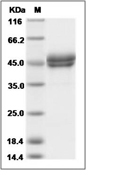Shopping Cart
- Remove All
 Your shopping cart is currently empty
Your shopping cart is currently empty

IgE Fc Protein, Human, Recombinant (His) is expressed in HEK293 mammalian cells with His tag. The predicted molecular weight is 37.4 kDa.

| Pack Size | Price | Availability | Quantity |
|---|---|---|---|
| 100 μg | $451 | In Stock | |
| 200 μg | $743 | 7-10 days | |
| 500 μg | $1,430 | 7-10 days |
| Biological Activity | Activity testing is in progress. It is theoretically active, but we cannot guarantee it. If you require protein activity, we recommend choosing the eukaryotic expression version first. |
| Description | IgE Fc Protein, Human, Recombinant (His) is expressed in HEK293 mammalian cells with His tag. The predicted molecular weight is 37.4 kDa. |
| Species | Human |
| Expression System | HEK293 Cells |
| Tag | C-His |
| Construction | A DNA sequence encoding the human IGHE (Cys104-Lys427) was expressed with a polyhistidine tag at the C-terminus. Predicted N terminal: Cys 104 |
| Protein Purity | > 95 % as determined by SDS-PAGE.  |
| Molecular Weight | 37.4 kDa (predicted); 45-49 kDa (reducing conditions) |
| Endotoxin | < 1.0 EU/μg of the protein as determined by the LAL method. |
| Formulation | Lyophilized from a solution filtered through a 0.22 μm filter, containing PBS, pH 7.4. Typically, a mixture containing 5% to 8% trehalose, mannitol, and 0.01% Tween 80 is incorporated as a protective agent before lyophilization. |
| Reconstitution | A Certificate of Analysis (CoA) containing reconstitution instructions is included with the products. Please refer to the CoA for detailed information. |
| Stability & Storage | It is recommended to store recombinant proteins at -20°C to -80°C for future use. Lyophilized powders can be stably stored for over 12 months, while liquid products can be stored for 6-12 months at -80°C. For reconstituted protein solutions, the solution can be stored at -20°C to -80°C for at least 3 months. Please avoid multiple freeze-thaw cycles and store products in aliquots. |
| Shipping | In general, Lyophilized powders are shipping with blue ice. |
| Research Background | Immunoglobulin E (IgE) is well known for its role in allergic disease, the manifestations of which are mediated through its two Fc receptors, FcεRI and CD23 (FcεRII). IgE and its interactions with these receptors are therefore potential targets for therapeutic intervention, and exciting progress has been made in this direction. Furthermore, recent structural studies of IgE-Fc, the two receptors, and of their complexes, have revealed a remarkable degree of plasticity at the IgE-CD23 interface and an even more remarkable degree of dynamic flexibility within the IgE molecule. |

Copyright © 2015-2025 TargetMol Chemicals Inc. All Rights Reserved.